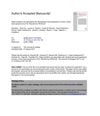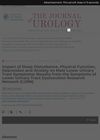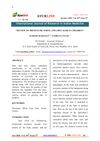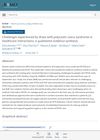12 citations,
January 2016 in “Skin Appendage Disorders” Hydroxychloroquine is ineffective for treating frontal fibrosing alopecia with lupus erythematosus.
 December 2013 in “Appetite”
December 2013 in “Appetite” A defective gene causes hair loss and taste insensitivity in BTBR mice.
 September 2011 in “Hair transplant forum international”
September 2011 in “Hair transplant forum international” The document's conclusion cannot be provided because the document is not accessible or understandable.
 March 2024 in “BMC cancer”
March 2024 in “BMC cancer” High levels of ST14 and TMEFF1 proteins in ovarian cancer are linked to worse patient outcomes and may be a new treatment target.
 February 2022 in “Research Square (Research Square)”
February 2022 in “Research Square (Research Square)” High TSPEAR levels in colorectal cancer predict worse outcomes.
 January 2022 in “Research Square (Research Square)”
January 2022 in “Research Square (Research Square)” High TSPEAR levels in colorectal cancer predict worse outcomes.
 October 2021 in “Dermatology Reports”
October 2021 in “Dermatology Reports” Higher IL-17A levels indicate more severe alopecia areata.
 April 2015 in “Reactions Weekly”
April 2015 in “Reactions Weekly” Finasteride toxicity information is limited, poor quality, and biased.
 10 citations,
July 2013 in “British Journal of Dermatology”
10 citations,
July 2013 in “British Journal of Dermatology” High MUC-18/MCAM levels in blood indicate a worse outlook for melanoma patients.
6 citations,
January 2019 in “Indian Journal of Dermatology, Venereology and Leprology” Low-cost dermoscopes can effectively diagnose early female pattern hair loss.
 4 citations,
September 2006 in “European Journal of Clinical Pharmacology”
4 citations,
September 2006 in “European Journal of Clinical Pharmacology” Finasteride doesn't affect omeprazole metabolism in Japanese people.
January 2022 in “Voennaâ medicina” A new method for treating male pattern baldness in men with a low chance of improvement was discussed.
 19 citations,
June 2020 in “Animals”
19 citations,
June 2020 in “Animals” Poor maternal nutrition can lead to fewer wool follicles in Chinese Merino sheep.
 19 citations,
September 2017 in “The Journal of urology/The journal of urology”
19 citations,
September 2017 in “The Journal of urology/The journal of urology” Poor sleep is linked to a higher risk of developing and worsening urinary problems in men.
9 citations,
August 2019 in “Lupus” Poor body image from pain can lead to more depression in lupus patients.
 6 citations,
January 2021 in “Journal of Cosmetic Dermatology”
6 citations,
January 2021 in “Journal of Cosmetic Dermatology” Poor sleep during the pandemic may increase stress and worsen hair loss conditions.
 4 citations,
February 2022 in “The Journal of Urology”
4 citations,
February 2022 in “The Journal of Urology” Poor sleep, physical health, depression, and anxiety can worsen urinary problems in men.
 3 citations,
June 2020 in “Cutis”
3 citations,
June 2020 in “Cutis” Poor nutrition can lead to skin diseases in hospitalized patients and should be quickly identified and treated.
 1 citations,
January 2022 in “Journal of Cutaneous Medicine and Surgery”
1 citations,
January 2022 in “Journal of Cutaneous Medicine and Surgery” Poor nutrition is linked to increased hair loss in Canadian children.
 1 citations,
May 2009 in “Annales de Dermatologie et de Vénéréologie”
1 citations,
May 2009 in “Annales de Dermatologie et de Vénéréologie” Environmental factors like smoking, UV exposure, and poor diet contribute to hair loss and graying, and lifestyle changes can help manage it.
 October 2020 in “Ayurline: international journal of research in indian medicine”
October 2020 in “Ayurline: international journal of research in indian medicine” Poor quality hair products contribute to premature greying in children.
 November 2014 in “Hair transplant forum international”
November 2014 in “Hair transplant forum international” Hair restoration surgery in patients with prior neurosurgery or radiation treatment can have risks like infection and poor wound healing, so it's important to discuss these with the patient.

Drinking sweetened tea and poor sleep habits may increase the risk of hair loss in women.

Drinking sweetened tea and poor sleep increase the risk of hair loss in women.

Drinking sweetened tea and poor sleep habits increase the risk of hair loss in women.
 May 2024 in “Reproductive BioMedicine Online”
May 2024 in “Reproductive BioMedicine Online” Patients with PCOS face poor communication and support from healthcare professionals.
 May 2024 in “Animal genetics”
May 2024 in “Animal genetics” A cat's poor wound healing was linked to a genetic deletion in the COL5A1 gene.
January 2014 in “Chinese Journal of Disaster Medicine” Rescue team members had poor nutrition and many health issues during the Pakistan floods.
1 citations,
March 2018 in “F1000Research” Diabetic neuropathy in mice is linked to poor mitochondria function and lower brain hormone production.

Drinking sweetened tea and soda and poor sleep may increase the risk of hair loss in women.























